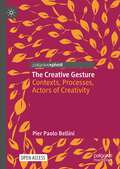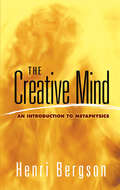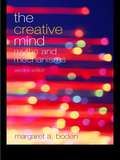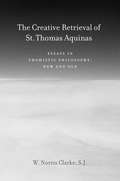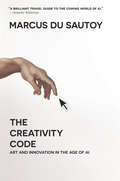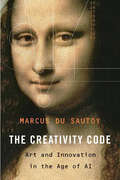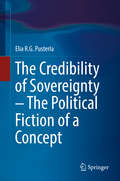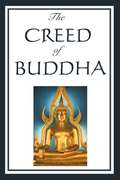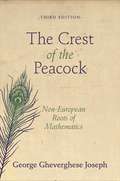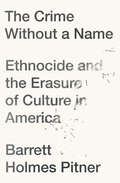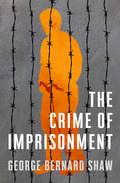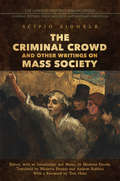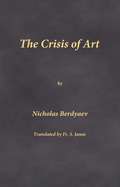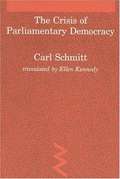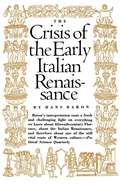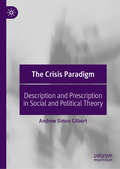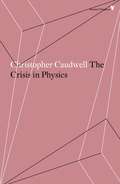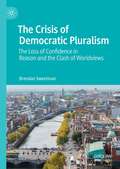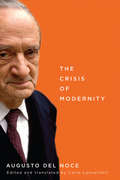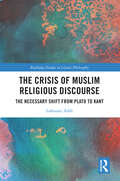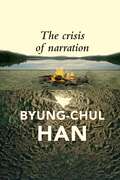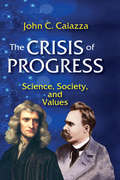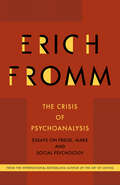- Table View
- List View
The Creative Gesture: Contexts, Processes, Actors of Creativity (Palgrave Studies in Creativity and Culture)
by Pier Paolo BelliniThis open access book offers a concise overview of the theories constructed within the various human sciences around the theme of creativity as a symbolic capacity to link things together: it manifests itself when the individual endowed with a certain type of intelligence encounters cultural and social conditions that enable them to develop that capacity to the maximum, rather than inhibiting it or diverting it to other fields where it is doomed to failure. Even the most intimate of human expressiveness is considered as a result of an active social relationality. Social dimensions of creativity (evaluation, primary socialization, motivation, leadership) and “creative processes” (creative attitude, creative gesture, divergent thinking, problem-solving capacity, interdisciplinary approach, randomness, algorithmic creativity) are also analysed.The book concludes by evaluating the course taken in the light of the relational theory of society: the development of creativity cannot beconceived outside of self-other relations.This book is the result of a translation done with the help of artificial intelligence. The text has subsequently been revised further by a professional copy editor in order to refine the work stylistically.
The Creative Mind: An Introduction to Metaphysics (Dover Books On Western Philosophy)
by Henri BergsonThe final published book by Nobel Prize-winning author and philosopher Henri Bergson (1859–1941), La pensée et le mouvant (translated here as The Creative Mind), is a masterly autobiography of his philosophical method. Through essays and lectures written between 1903 and 1923, Bergson retraces how and why he became a philosopher, and crafts a fascinating critique of philosophy itself. Until it leaves its false paths, he demonstrates, philosophy will remain only a wordy dialectic that surmounts false problems.With masterful skill and intensity, Bergson shows that metaphysics and science must be rooted in experience for philosophy to become a genuine search for truth. And in the quest for unanswered questions, the spiritual dimension of human life and the importance of intuition must be emphasized. A source of inspiration for physicists as well as philosophers, Bergson's introduction to metaphysics reveals a philosophy that is always on the move, blending man's spiritual drive with his mastery of the material world.
The Creative Mind: Myths and Mechanisms
by Margaret A. BodenHow is it possible to think new thoughts? What is creativity and can science explain it? And just how did Coleridge dream up the creatures of The Ancient Mariner? When The Creative Mind: Myths and Mechanisms was first published, Margaret A. Boden's bold and provocative exploration of creativity broke new ground. Boden uses examples such as jazz improvisation, chess, story writing, physics, and the music of Mozart, together with computing models from the field of artificial intelligence to uncover the nature of human creativity in the arts. The second edition of The Creative Mind has been updated to include recent developments in artificial intelligence, with a new preface, introduction and conclusion by the author. It is an essential work for anyone interested in the creativity of the human mind.
The Creative Retrieval of Saint Thomas Aquinas: Essays in Thomistic Philosophy, New and Old
by W. Norris Clarke S.J.W. Norris Clarke has chosen the fifteen essays in this collection, five of which appear here for the first time, as the most significant of the more than seventy he has written over the course of a long career. Clarke is known for his development of a Thomistic personalism. To be a person, according to Saint Thomas, is to take conscious self-possession of one's own being, to be master of oneself. But our incarnate mode of being human involves living in a body whose life unfolds across time, and is inevitably dispersed across time. If we wish to know fully who we are, we need to assimilate and integrate this dispersal, so that our lives become a coherent story. In addition to the existentialist thought of Etienne Gilson and others, Clarke draws on the Neoplatonic dimension of participation. Existence as act and participation have been the central pillars of his metaphysical thought, especially in its unique manifestation in the human person.The essays collected here cover a wide range of philosophical, ethical, religious, and aesthetic topics. Through them sounds a very personal voice, one that has inspired generations of students and scholars.
The Creativity Code: Art and Innovation in the Age of AI
by Marcus Du SautoyMost books on AI focus on the future of work. But now that algorithms can learn and adapt, does the future of creativity also belong to well-programmed machines? To answer this question, Marcus du Sautoy takes us to the forefront of creative new technologies and offers a more positive and unexpected vision of our future cohabitation with machines.
The Creativity Code: Art and Innovation in the Age of AI
by Marcus du SautoyMost books on AI focus on the future of work. But now that algorithms can learn and adapt, does the future of creativity also belong to well-programmed machines? To answer this question, Marcus du Sautoy takes us to the forefront of creative new technologies and offers a more positive and unexpected vision of our future cohabitation with machines.
The Credibility of Sovereignty - The Political Fiction of a Concept
by Elia R.G. PusterlaThe book deeply analyses the bilateral relations between Switzerland and the European Union and their effect on the former's sovereignty in the context of Europeanisation. This touches on philosophical debates on the complexity of sovereignty. What sovereignty is at stake when talking about Swiss-EU relations? This issue not only faces the elusiveness of sovereignty as a concept, but also the proliferation of hypocrisy on its presence within states. The book encounters the deconstructionist hypothesis stating that there is nothing to worry about but the belief there is something to worry about. Derrida's deconstruction of sovereignty allows indeed one to grasp the fictional essence of sovereignty based on the metaphysics of presence. The presence of self-positing sovereign ipseity is fictional since absent in the present, but spectrally present in the belief of its presence to come. Sovereignty is a matter of credibility, or the credible promise of a normative statement to come. Hence, the book challenges the realist/neorealist argument stating that states are credibly sovereign until proven otherwise and explains that the debate on state sovereignty calls for the unveiling of this hypocritical epistemology cunningly disguised as an objective presence. Swiss-EU relations thus become the cornerstone to not only theorise but also test sovereignty and deconstruct the two ontological and epistemological sides of the same coin, or the modern hypocrisy of sovereignty. This deconstruction constitutes the very problématique of any attempt to understand whether and how a state can be sovereign and solve the problem as to how to neutralise the différance and identify the difference between credible and incredible claims of sovereignty. This problématique connects the theory and practice of sovereignty innovatively, providing positivist evidence on the arguable credibility of the Swiss claim of sovereignty and confirming the presence of a theological dimension within politics.
The Creed of Buddah
by BuddahPhilosophy is, in its essence, the quest of reality. In the attempt to determine what is real, one has to choose, in the first instance, between the percipient self and the things that it perceives. This choice may seem to be purely metaphysical, but sooner or later it becomes a moral choice and one which is decisive of the chooser's destiny.
The Crest of the Peacock
by George Gheverghese JosephFrom the Ishango Bone of central Africa and the Inca quipu of South America to the dawn of modern mathematics, The Crest of the Peacock makes it clear that human beings everywhere have been capable of advanced and innovative mathematical thinking. George Gheverghese Joseph takes us on a breathtaking multicultural tour of the roots and shoots of non-European mathematics. He shows us the deep influence that the Egyptians and Babylonians had on the Greeks, the Arabs' major creative contributions, and the astounding range of successes of the great civilizations of India and China. The third edition emphasizes the dialogue between civilizations, and further explores how mathematical ideas were transmitted from East to West. The book's scope is now even wider, incorporating recent findings on the history of mathematics in China, India, and early Islamic civilizations as well as Egypt and Mesopotamia. With more detailed coverage of proto-mathematics and the origins of trigonometry and infinity in the East, The Crest of the Peacock further illuminates the global history of mathematics.
The Crime Without a Name: Ethnocide and the Erasure of Culture in America
by Barrett Holmes PitnerIn this incisive blend of personal narrative and philosophical inquiry, journalist and activist Barrett Holmes Pitner seeks a new way to talk about racism in America.Can new language reshape our understanding of the past and expand the possibilities of the future? The Crime Without a Name follows Pitner&’s journey to identify and remedy the linguistic void in how we discuss race and culture in the United States. Ethnocide, first coined in 1944 by Jewish exile Raphael Lemkin (who also coined the term "genocide"), describes the systemic erasure of a people&’s ancestral culture. For Black Americans, who have endured this atrocity for generations, this erasure dates back to the transatlantic slave trade and reached new resonance in a post-Trump world. Just as the concept of genocide radically reshaped our perception of human rights in the twentieth century, reframing discussions about race and culture in terms of ethnocide can change the way we understand our diverse and rapidly evolving racial and political climate in a time of increased visibility around police brutality and systemic racism. The Crime Without a Name traces the historical origins of ethnocide in the United States, examines the personal, lived consequences of existing within an ongoing erasure, and offers ways for readers to combat and overcome our country&’s ethnocidal foundation.
The Crime of Imprisonment
by George Bernard ShawThe Nobel Prize–winning social critic examines the absurdities and moral indignities of modern incarceration in this classic work. Best known for his theatrical works of biting social satire, George Bernard Shaw was also a committed political activist who, at various times, found himself in conflict with the law. Though he was never arrested, Shaw was deeply concerned with the experience of imprisonment and its debilitating effects on inmates. In this polemical study of the contemporary prison system, Shaw dismantles many of the standard arguments for harsh prison sentences. He argues that the impulse for retribution is at odds with the goal of reform, and that prison often fosters greater criminality rather than acting as a deterrent.
The Criminal Crowd and Other Writings on Mass Society (Lorenzo Da Ponte Italian Library)
by Tom Huhn Nicoletta Pireddu Scipio SigheleThe Criminal Crowd and Other Writings on Mass Society is the first English collection of writings by Italian jurist, sociologist, cultural and literary critic Scipio Sighele. Sighele is largely responsible for providing post-unification Italy with a new outlook on issues ranging from the blurring line between individual and collective accountability, the role of urbanization in the development of criminality, and the emancipation of women. This work draws a multifaceted portrait of a provocative thinker and public intellectual caught between tradition and modernity during the European fin de siècle. Containing a comprehensive introduction by the editor, The Criminal Crowd and Other Writings on Mass Society includes Sighele’s seminal work, The Criminal Crowd, as well as his formative studies on group behaviour. Nicoletta Pireddu contextualizes Sighele’s contribution to the so-called ‘age-of crowds,’ from the fierce polemic with his French rivals Gustave LeBon and Gabriel Tarde to the scientific, literary, and cultural developments of his conceptualization of mass behaviours as a legitimate object of psychological investigation into a new century.
The Crisis Of Art
by Nicholas Berdyaev S. Janos1st English translation from the Russian: "The Crisis of Art," an insightful booklet of 47 pages by the Russian religious philosopher Nicholas Berdyaev in 1918, originally comprised 3 articles. The present English text has been expanded into 9 related articles written by Berdyaev during this period, arranged into a threefold triadic schema. The 1st triad of articles in the present text are those contained in the original 1918 Russian text. The cover article, "The Crisis of Art," serving also as title to the booklet, examines cultural trends in art, both visual and literary, such as Symbolism, Decadentism, Cubism, Futurism (Filippo Marinetti) with mention of now obscure figures as Chiurlenis. Both "Picasso" visually and A. Bely's 1916 "Peterburg" novel give expression to the disintegrative features of the modern consciousness. The second triad of articles concern the Russian cultural figure, Vyacheslav Ivanov, mentioned in the initial article, concerning the lost aspect of "theurgy" in art, and attempts to recapture this in light of Nietzsche's Dionysianism. A "culture" as such in its dynamic youthful origins developes from within the "cultus," the "religious cult," and later ossifies losing its vitality. But such attempts at recapturing this initial experience typically prove artificial, prove to be mere "affectations of culture," of the genuine "experience," in Berdyaev's critique of Vyach. Ivanov. The third triad of articles further addresses this defect. The article on A. Bely's 1910 novel, "The Silver Dove," is a chilling account of a member of the Russian intelligentsia, intellectually very sophisticated but empty of soul and bearing, becoming involved with a Russian Khlysty-like sect, "the Doves." The second article, written abroad in 1923, addresses A. Bely's reminiscences of the Russian poet Aleksandr Blok (died 1921), and a failure at a "discerning of spirits" among the cultural element. The final Berdyaev article, on the obscure French Catholic figure Léon Bloy (died 1917), is the most engagingly unique in our text. Written in 1914, for nearly a century until 2005, this was the only source written in Russian on L. Bloy, and nigh impossible to find, but a treasure to peruse. Bloy is in ways considered final representative of a decadentist French literary cultural trend, whose names are unfamiliar to most. But L. Bloy is characteristic of no trend, nor would any trend be comfortable having him. Roughly contemporary to Nietzsche, he bears similarities with Nietzsche, but whereas Nietzsche retreated into lofty isolation, L. Bloy took the "low road" into the bourgeois muck of life. He is a man obsessed with the Absolute, with the "existential man," with the unrepeatable unique fate and destiny of each person, concerning which it is only for God to judge. At first impression he provokes and repels, he is an irascible and impossible fellow, an obsessive with uncouth words and mannerisms. But on second thought, as Berdyaev notes, he is typical of the Russian "holy fools" of old, and we come to feel fascination that we have encountered the perspicacity of a seer. He is a man at the extreme, one relying on no tomorrow or the day after, and his obsession at times borders on the demonic, as Berdyaev notes, requiring a "discerning of spirits." His intuition of the "aloneness" of both God and the individual person is unique. Bloy's critique of the "bourgeois" is not the typical socio-political label of ideologues, but a pervasively profound "metaphysics of bourgeoisness." Léon Bloy richly deserves further study as a significant French Catholic personalist and existentialist philosophic figure, which Berdyaev's article invites. The 10th article appended in our text was not penned by Berdyaev; rather, it suggests the threefold triadic structure to our text, symbolically. The present book is part of a continuing series of works of Russian religious philosophy in 1st English translation.
The Crisis Of Parliamentary Democracy
by Ellen Kennedy Carl Schmitt Thomas McCarthyThe Crisis of Parliamentary Democracy offers a powerful criticism of the inconsistencies of representative democracy. <p><p> Described both as "the Hobbes of our age" and as "the philosophical godfather of Nazism," Carl Schmitt was a brilliant and controversial political theorist whose doctrine of political leadership and critique of liberal democratic ideals distinguish him as one of the most original contributors to modern political theory. The Crisis of Parliamentary Democracy offers a powerful criticism of the inconsistencies of representative democracy. <p> First published in 1923, it has often been viewed as an attempt to destroy parliamentarism; in fact, it was Schmitt's attempt to defend the Weimar constitution. The introduction to this new translation places the book in proper historical context and provides a useful guide to several aspects of Weimar political culture. The Crisis of Parliamentary Democracy is included in the series Studies in Contemporary German Social Thought, edited by Thomas McCarthy.
The Crisis Of The Early Italian Renaissance
by Hans BaronHans Baron was one of the many great German émigré scholars whose work Princeton brought into the Anglo-American world. His Crisis of the Early Italian Renaissance has provoked more discussion and inspired more research than any other twentieth-century study of the Italian Renaissance. <p><p> Baron's book was the first historical synthesis of politics and humanism at that momentous critical juncture when Italy passed from medievalism to the thought of the Renaissance. Baron, unlike his peers, married culture and politics; he contended that to truly understand the Renaissance one must understand the rise of humanism within the political context of the day. This marked a significant departure for the field and one that changed the direction of Renaissance studies. Moreover, Baron's book was one of the first major attempts of any sort to ground intellectual history in a fully realized historical context and thus stands at the very origins of the interdisciplinary approach that is now the core of Renaissance studies. <p> Baron's analysis of the forces that changed life and thought in fifteenth-century Italy was widely reviewed domestically and internationally, and scholars quickly noted that the book "will henceforth be the starting point for any general discussion of the early Renaissance." The Times Literary Supplement called it "a model of the kind of intensive study on which all understanding of cultural process must rest." First published in 1955 in two volumes, the work was reissued in a one-volume Princeton edition in 1966.
The Crisis Paradigm: Description and Prescription in Social and Political Theory
by Andrew Simon GilbertThis book examines how 20th century theorists have used a discourse of “crisis” to frame their conceptualizations of modernity. Through an investigation of four key thinkers (Georg Lukács, Hannah Arendt, Reinhart Koselleck and Jürgen Habermas), Gilbert argues that scholars in the social sciences and humanities should be cautious of treating crises as explananda for research. Instead, the book calls for sociological analysis of the role of “crisis” within social scientific discourse, and examines how “crisis” has been used as a conceptual frame for legitimating theoretical agendas. Gilbert’s “sociology of concepts” approach presents crisis as a paradigm of modern thought, and, more generally, reflects on how concepts can become the carriers of diverse intellectual traditions and debates. The Crisis Paradigm will be of interest to students and scholars of social and critical theory, politics, sociology and history, as well as those working in the fields of media studies, communication and discourse analysis.
The Crisis in Physics
by Christopher CaudwellCaudwell’s controversial book offers an astute and enduring diagnosis of the maladies of bourgeois epistemology.
The Crisis of Democratic Pluralism: The Loss of Confidence in Reason and the Clash of Worldviews
by Brendan SweetmanThis book argues that contemporary liberal democracy is reaching a crisis. Brendan Sweetman contends that this crisis arises from a contentious pluralism involving the rise of incommensurable worldviews that emerge out of the absolutizing of freedom over time in a democratic setting. This clash of worldviews is further complicated by a loss of confidence in reason and by the practical failure of public discourse. A contributory factor is the growing worldview of secularism which needs to be distinguished from both the process of secularization and the concept of the secular state. After describing the crisis, and exploring these themes, and also rejecting proposed solutions from recent liberal political theory, Sweetman develops an approach to pluralist disagreement which requires a re-envisioning of the relationship between religion, secularism and politics, and which allows a limited place for all worldviews in the state, including religious worldviews. Engaging with the work of Philip Kitcher, Robert Audi, John Rawls, A.C. Grayling, Martin Luther King, Cécile Laborde, John Stuart Mill, John Locke, and Plato, Sweetman's approach is a formidable innovation in the quest to maintain a free and fair society.
The Crisis of Global Modernity
by Prasenjit DuaraIn this major new study, Prasenjit Duara expands his influential theoretical framework to present circulatory, transnational histories as an alternative to nationalist history. Duara argues that the present day is defined by the intersection of three global changes: the rise of non-western powers, the crisis of environmental sustainability and the loss of authoritative sources of what he terms transcendence - the ideals, principles and ethics once found in religions or political ideologies. The physical salvation of the world is becoming - and must become - the transcendent goal of our times, but this goal must transcend national sovereignty if it is to succeed. Duara suggests that a viable foundation for sustainability might be found in the traditions of Asia, which offer different ways of understanding the relationship between the personal, ecological and universal. These traditions must be understood through the ways they have circulated and converged with contemporary developments.
The Crisis of Modernity
by Augusto Del Noce Carlo LancellottiIn his native Italy Augusto Del Noce is regarded as one of the preeminent political thinkers and philosophers of the period after the Second World War. The Crisis of Modernity makes available for the first time in English a selection of Del Noce's essays and lectures on the cultural history of the twentieth century. Del Noce maintained that twentieth-century history must be understood specifically as a philosophical history, because Western culture was profoundly affected by the major philosophies of the previous century such as idealism, Marxism, and positivism. Such philosophies became the secular, neo-gnostic surrogate of Christianity for the European educated classes after the French Revolution, and the next century put them to the practical test, bringing to light their ultimate and necessary consequences. One of the first thinkers to recognize the failure of Marxism, Del Noce posited that this failure set the stage for a new secular, technocratic society that had taken up Marx's historical materialism and atheism while rejecting his revolutionary doctrine. Displaying Del Noce's rare ability to reconstruct intellectual genealogies and to expose the deep metaphysical premises of social and political movements, The Crisis of Modernity presents an original reading of secularization, scientism, the sexual revolution, and the history of modern Western culture.
The Crisis of Modernity (McGill-Queen's Studies in the History of Ideas #107)
by Carlo Lancellotti Augusto Del NoceIn his native Italy Augusto Del Noce is regarded as one of the preeminent political thinkers and philosophers of the period after the Second World War. The Crisis of Modernity makes available for the first time in English a selection of Del Noce's essays and lectures on the cultural history of the twentieth century. Del Noce maintained that twentieth-century history must be understood specifically as a philosophical history, because Western culture was profoundly affected by the major philosophies of the previous century such as idealism, Marxism, and positivism. Such philosophies became the secular, neo-gnostic surrogate of Christianity for the European educated classes after the French Revolution, and the next century put them to the practical test, bringing to light their ultimate and necessary consequences. One of the first thinkers to recognize the failure of Marxism, Del Noce posited that this failure set the stage for a new secular, technocratic society that had taken up Marx’s historical materialism and atheism while rejecting his revolutionary doctrine. Displaying Del Noce's rare ability to reconstruct intellectual genealogies and to expose the deep metaphysical premises of social and political movements, The Crisis of Modernity presents an original reading of secularization, scientism, the sexual revolution, and the history of modern Western culture.
The Crisis of Muslim Religious Discourse: The Necessary Shift from Plato to Kant (Routledge Studies in Islamic Philosophy)
by Lahouari AddiShowing that Muslim societies are facing a crisis that is more cultural than religious, this book focuses on cultural representations through which social life is experienced in the Muslim world. It brings a new theoretical framework to address the secularization process that is underway and the contradictions it entails. This volume will arouse a new debate on secularization and the relations between religion, culture and philosophy. The crisis Muslim societies are undergoing pertains to the culture and not to the Qur’an to the extent that people do not have access to the sacred in itself but only for oneself, meaning a cultural interpretation of the sacred. The Qur’an in itself is not an obstacle to secularization and modernization since any sacred text is experienced through culture. If we consider the European experience where secularization has first emerged, we see that culture has been transformed from medieval metaphysics to modern philosophy upholding a civic culture. Discussing secularization through cultural representation, this book launches new ideas that fill an important gap in the literature on secularization. It is a key resource for any readers interested in religious studies, philosophy and the anthropology of religion.
The Crisis of Narration
by Byung-Chul HanNarratives produce the ties that bind us. They create community, eliminate contingency and anchor us in being. And yet in our contemporary information society, where everything has become arbitrary and random, storytelling becomes storyselling and narratives lose their binding force. Whereas narratives create community, storytelling brings forth only a fleeting community – the community of consumers. No amount of storytelling could recreate the fire around which humans gather to tell each other stories. That fire has long since burnt out. It has been replaced by the digital screen, which separates people rather than bringing them together. Through storytelling, capitalism appropriates narrative: stories sell. They are no longer a medium of shared experience. The inflation of storytelling betrays a need to cope with contingency, but storytelling is unable to transform the information society back into a stable narrative community. Rather, storytelling as storyselling is a pathological phenomenon of our age. Byung-Chul Han, one of the most perceptive cultural theorists of contemporary society, dissects this crisis with exceptional insight and flair.
The Crisis of Progress: Science, Society, and Values
by John C. CaiazzaThis book is about the concept of progress, its separate varieties, its current rejection, and how it may be reconsidered from a philosophical and scientific basis. John C. Caiazza's main emphasis is on how science is understood as it has a direct impact on social values as expressed by prominent philosophers. He argues that progress is at a standstill, which presents a crisis for Western civilization.Caiazza presents historical examples, both of scientific inquiry and social and cultural themes, to examine the subject of progress. Beginning with the Whig model and progressive political values exemplified by Bacon and Dewey, he also examines other variations, the Enlightenment, cosmopolitanism, and totalitarianism. Technology, argues Caiazza, also has a stultifying effect on Western culture and to understand the idea of progress, we must take a philosophic rather than a scientific point of view. Modern cosmology has inevitable humanistic and theological implications, and major contemporary philosophers reject social science in favour of ancient concepts of virtue and ethics.In the end, Caiazza writes that time is an agent, not a neutral plain on which scientific and historical events occur. We can expect technology to keep us in stasis or become aware of the possibility of transcendence. This book will be of interest for students of scientific history and philosophy.
The Crisis of Psychoanalysis: Essays on Freud, Marx and Social Psychology
by Erich Fromm&“This book is must reading . . . although it will at times shock and perhaps even offend the sensibilities of traditional therapists.&” —American Journal of Psychiatry This book brings together Erich Fromm&’s basic statements on the application of psychoanalytic theory to social dynamics. At the same time, it offers an image of man consonant with the hopes of radical humanism.The Crisis of Psychoanalysis is a collection of nine brilliant essays. Although his work is deeply rooted in Freudian theory, Fromm further develops Freud&’s doctrines by including both social and ethical dimensions, and applies his discoveries and insights to address the problems we face in society at large. &“This collection is a fine representative sampling from a lucid, humane, always attractive writer.&” —Kirkus Reviews &“Highly recommended.&” —Library Journal
